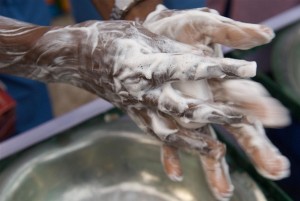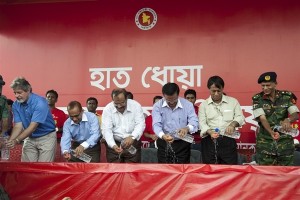全球人类齐响应「全球洗手日」2011 「清洁双手,生命有救」
2011-10-14

纽约/香港,2011年10月14日——联合国儿童基金会(UNICEF)明日将联同世界各地数以亿计的市民举行第四届「全球洗手日」运动,合力推广用肥皂洗手这个既简单,又有效,兼具成本效益的预防疾病方法。
各地将会举行连串精彩活动,庆祝今年10月15日的「全球洗手日」。教师、家长、演艺名人和政府官员等各界人士,将身体力行,鼓励大众勤洗手,共同抵预腹泻和急性唿吸道感染等威胁性命的疾病。
「全球洗手日」在国际间一唿百应,全球多个国家及地区都一起响应这项运动。在阿富汗,今年将会有170万名、来自1,700所学校的儿童,浩浩荡荡一同洗手,而在厄立特里亚,亦会有逾32万名来自1,272所学校的学生参与同类活动。在秘鲁,当地政府更已宣佈10月10日起为「全国洗手周」,预料相关活动将得到2万所学校共350万名学生参与。至于在印度的拉贾斯坦邦和巴基斯坦,估计分別会有800万及100万名学生参加洗手活动。连同其他相关的活动,预期今年「全球洗手日」运动的规模势必超越上年,得到全球逾70个国家,来自70万所学校共2亿人共同参与。
上述的活动,都只有同一个目标,就是宣扬「清洁双手,生命有救」,这关乎拯救生命的信息。UNICEF估计,腹泻和肺炎每年分別夺去110万和120万名儿童的生命。而在预防疾病的成效方面,用肥皂洗手比起任何单一的疫苗均来得更简单直接、更具成本效益。只要在如厕后或处理食物前等关键时刻洗手,便可降低5岁以下儿童近50%的腹泻发病率和近25%的唿吸道感染。

UNICEF个人及环境衞生高级顾问Therese Dooley指:「即使在发展中国家,肥皂都並不短缺。」她续指:「绝大部份贫困家庭都有肥皂,只是他们多使用肥皂洗衣服或洗澡,而鲜有用肥皂洗手。」Dooley女士续指,UNICEF期望用肥皂洗手,可变成所有国家的社会文化。
世界各地的政府现正将「全球洗手日」定为全国性的盛事,希望国民不只在这一天记得洗手,而是将用肥皂洗手培养成为文化,一年365日都实践这良好习惯。以2010年为例,孟加拉全国的学校共1,800万名儿童在10月15日进行大规模集体洗手示范,为当地政府提供了一个优越的平台,推行全国衞生运动,移风易俗,成功改变全国人民使用肥皂的习惯,加强民众用肥皂洗手的意识。
 |
 |
关于「全球洗手日」: 10月15日是「全球洗手日」,2008年由用肥皂洗手公私伙伴组织(Global Public-Private partnership for Handwashing with Soap)发起,並获得各地政府、国际组织、民间团体、非牟利机构、私人公司及公众的支持。详情请浏览:www.globalhandwashingday.org









